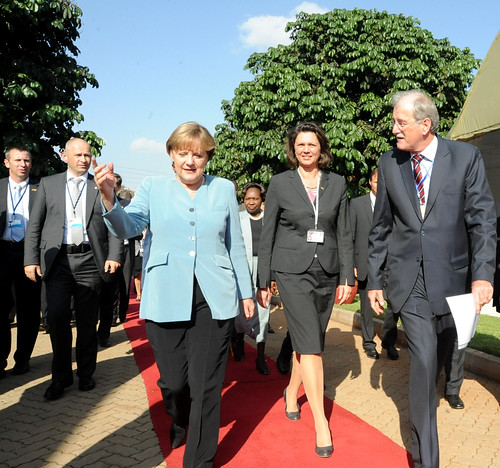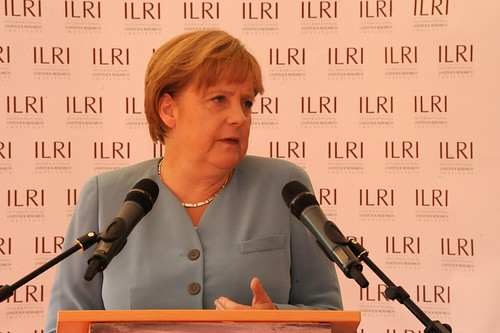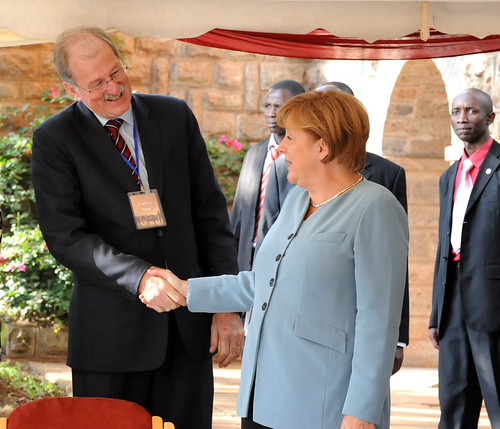German Chancellor Angela Merkel, German Agriculture Minister Ilse Aigner, and Carlos Seré, director general of the International Livestock Research Institute (ILRI), at ILRI’s campus in Nairobi, Kenya, 12 July 2011 (photo credit: ILRI).
Chancellor Angela Merkel of the Federal Republic of Germany visited Kenya today (Tue 12 Jul 2011) as the first part of a three-day, three-nation, African tour.
This morning, in the presence of the Chancellor, Merkel’s ambassador to Kenya, Ms Margit Hellwig-Boette, signed an agreement between Germany and the International Livestock Research Institute (ILRI), which is headquartered in Kenya. The signing ceremony was part of a press conference given by Kenyan Prime Minister Raila Odinga at Nairobi’s Intercontinental Hotel.
Germany has been one of ILRI’s top donors for many years, contributing more than USD11 million in just the past six years.
The new agreement Germany and ILRI signed launches a project Germany is funding in Kenya to be led by ecology researchers at ILRI and local partners in Kenya. The study will assess the state of Kenya’s ‘eco-conservancies’, which strive to benefit both Kenya’s wildlife and the pastoral people who have been stewards of wildlife in this country for centuries. The study will examine the benefits accruing from the establishment of these eco-conservancies in terms of both wildlife conservation and poverty reduction among Kenya’s pastoral communities.
Following the signing ceremony, attended by ILRI Director General Carlos Seré and ILRI’s Director of Partnerships and Communications Bruce Scott, Chancellor Merkel attended a State luncheon given by President Mwai Kibaki, to which ILRI’s director general was also invited. Chancellor Merkel then proceeded to the University of Nairobi, where she gave a keynote address.
Later in the afternoon, the Chancellor paid a visit to ILRI’s campus, in Nairobi’s Kabete suburb. Chancellor Merkel was met by ILRI Director General Seré, who welcomed her with a few remarks, noting in particular the key role science can play in helping the world feed its growing human populations.
‘Our challenge over the next four decades,’ said Seré, ‘is to feed another 2 billion people, nearly 1 billion more people in Africa alone, from the same or smaller resource base. As a scientist,’ Seré told the Chancellor, ‘I’m sure you appreciate how important research is to rising to the global challenge to feed the world sustainably.’
The ILRI director general then described the benefits of ILRI-German partnerships over many years in diverse fields, from climate change adaptation to carbon sequestration schemes to vaccine development, all conducted in Kenya; to increasing water-use efficiencies on mixed crop-livestock farms in the Nile Basin; to forestalling parasite drug resistance in West Africa; to ensuring safe milk, meat and egg production and marketing in southern Africa.
Seré concluded by requesting the Chancellor’s help in raising awareness in Germany and elsewhere of the importance of science in helping this continent to become food secure.
‘Please tell your listeners that science partnerships in this matter matter,’ said Seré.
‘Only through such partnerships will we manage to tackle the world’s increasingly complex development problems.’
Chancellor Angela Merkel making a few remarks at ILRI (photo credit: ILRI).
Chancellor Merkel than made a few remarks to the ILRI and diplomatic communities assembled outside ILRI’s new greenhouse.
After this, ILRI’s Carlos Seré and Bruce Scott led the German Chancellor on a tour of a few of ILRI’s advanced biosciences laboratories, where Merkel spoke to several scientists about their research on the crops and farm animals that are the mainstay of poor people throughout the developing world.
ILRI Director General Carlos Seré and German Chancellor Angela Merkel at ILRI (photo credit: ILRI).
The afternoon ended with ILRI’s Carlos Seré thanking the Chancellor for taking the time in her busy schedule to see at first-hand some of the high-quality and relevant science being conducted in Africa to solve some of Africa’s most intractable agricultural problems.



